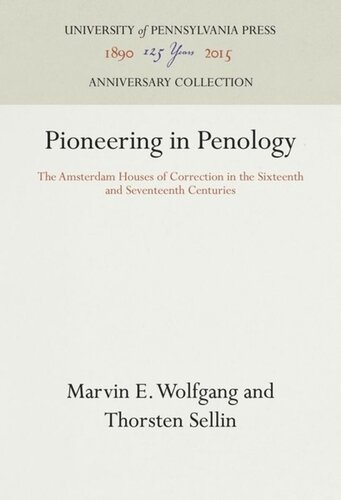

Most ebook files are in PDF format, so you can easily read them using various software such as Foxit Reader or directly on the Google Chrome browser.
Some ebook files are released by publishers in other formats such as .awz, .mobi, .epub, .fb2, etc. You may need to install specific software to read these formats on mobile/PC, such as Calibre.
Please read the tutorial at this link: https://ebookbell.com/faq
We offer FREE conversion to the popular formats you request; however, this may take some time. Therefore, right after payment, please email us, and we will try to provide the service as quickly as possible.
For some exceptional file formats or broken links (if any), please refrain from opening any disputes. Instead, email us first, and we will try to assist within a maximum of 6 hours.
EbookBell Team

4.7
26 reviewsFrom the Preface
In the story of punishment, the institutions described in this monograph hold a significant place, yet their role in shaping the history of prisons has not hitherto been explored by any American or English historian of institutions. In vain do we look for even a mention of them in works like George Ives' A History of Penal Methods or in the older pioneer writings of E. C. and F. H. Wines. With one or two exceptions, even the many textbooks of criminology published in the United States in the last two decades ignore them. This is understandable when we consider that except for brief and cursory references in rather inaccessible Continental works of the eighteenth century, the "rediscovery" of the Amsterdam houses of correction did not occur until 1898, when Robert von Hippel published his splendid article about them in the Zeitschrift für die gesamte Strafrechtswissenschaft.
Hippel established once for all the contribution of the Dutch municipalities of the late sixteenth and early seventeenth centuries to the rise of correctional imprisonment. It is largely to Hippel's study, which came to the author's notice nearly twenty years ago, that he owes an abiding interest in the history of punishment. Many scholars abroad were equally inspired by it, and a number of monographic studies of local German penal institutions by Hippel's own students at Göttingen resulted from it. Hallema's excellent researches into the history of the Dutch houses of correction might never have been made without the stimulus of Hippel's investigations.
Were it not for the wealth of new data uncovered in the last forty years and the absence of any adequate description of the Amsterdam houses of correction in the English language, this monograph might appear to be a mere threshing of old straw. The reasons just offered are believed sufficient justification, however, for writing their story anew. It has been a pleasant PREFACE task even though the author has been unable to do full justice to it. Perhaps everyone who attempts to seize a portion of the pulsating life of a past era feels the same disappointment. Nevertheless, this monograph is presented in the hope that it will prove of interest to penologists at least and will demonstrate that the history of punishment is well worth exploration.
T.S.
Philadelphia,
April 1944